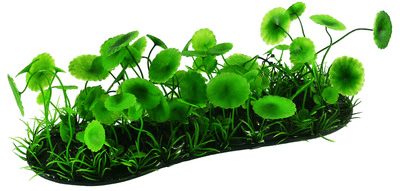


The Banana Lily (Nymphoides aquatica) is a distinctive freshwater plant, renowned for its banana-shaped tubers and lily pad-like leaves. Native to the southeastern United States, it thrives in calm, slow-moving waters. This plant adds a unique aesthetic to aquariums and is favored for its ease of care and rapid growth.
Scientific Name: Nymphoides aquatica
Common Names: Banana Lily, Banana Plant, Big Floating Heart
Origin: Southeastern United States
Size: Leaves can reach up to 15 cm (6 inches) in diameter
Growth Rate: Moderate to fast under optimal conditions
Lighting Requirements: Moderate to high light
CO₂ Requirement: Not required
Placement: Foreground to midground
Water Parameters:
Temperature: 20–27°C (68–81°F)
pH Level: 6.0–7.5
Hardness: 3–6 dKH.
Unique Appearance: The banana-shaped tubers provide a distinctive look, making it a focal point in any aquarium.
Versatile Growth: Can be grown rooted or as a floating plant, adapting to various aquascaping designs.
Low Maintenance: Ideal for both beginners and experienced aquarists due to its hardy nature.
Natural Filtration: Helps improve water quality by absorbing excess nutrients.
Planting: Place the plant on the substrate without burying the tubers completely; partial burial encourages root development while maintaining the plant's health.
Lighting: Provide moderate to high lighting to promote healthy growth and leaf development.
Fertilization: Supplement with liquid fertilizers to enhance growth, especially in nutrient-deficient setups.
Pruning: Trim dead or decaying leaves to encourage new growth and maintain plant health.
Q: Can the Banana Lily be used in outdoor ponds?
A: Yes, it thrives in calm, shallow pond environments with adequate lighting.
Q: Does it require CO₂ supplementation?
A: No, CO₂ is not necessary, but it can enhance growth if provided.
Q: How does it propagate?
A: Propagation occurs through runners and division of tubers.
Q: Is it compatible with all fish species?
A: Generally, yes; however, avoid housing with herbivorous fish that may consume the plant.
Thanks for subscribing!
This email has been registered!
